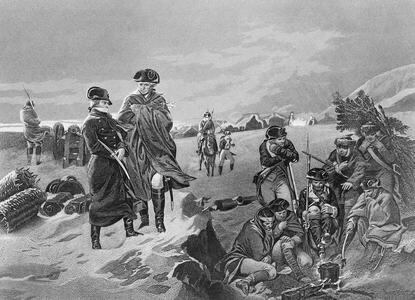Last fall’s discourse about the relationship between patriotism, the military and the public is not a new discussion.
Over the winter at Valley Forge, where Gen. George Washington’s Continental Army began establishing an encampment 240 years ago on Dec. 19, a gulf began between the public and the military that was the forerunner of today’s arguments.
Gen. Washington settled the dispute during the Revolution. How he did so offers lessons for today.
Much of the popular history of Valley Forge is accurate. As they established their encampment, the Continentals were dispirited after a long, losing campaign and desperately short on uniforms, shoes, equipment, blankets and winter clothing.
The Army had no meat and little flour. Although the winter was not exceptionally cold, frostbite still afflicted many soldiers. Typhus also raged and thousands of men suffered in squalid hospitals.
Washington informed Congress that without immediate remedy the Continental Army would be forced to “starve, dissolve, or disperse.”
But Valley Forge was more than a location of suffering. Washington and Congress began organizational reforms that relieved the Army’s most critical logistics issues.
Under Washington’s guidance, the colorful Prussian volunteer Baron Friedrich von Steuben trained the Army to maneuver with the same discipline as their British opponents and instilled leadership principles that survive in the Army today.
The Continentals still faced significant challenges during the course of the Revolution. But after Valley Forge, they matched or bested British Regulars in battle.
Valley Forge’s place in American history is not only an example of soldierly resiliency, but also as the birthplace of America’s professional army.

However, the professionalism that began at Valley Forge had unintended consequences. As historian Charles Royster describes in “A Revolutionary People at War,” as the troops gained martial confidence and pride, they also considered themselves superior to the public in patriotism.
The Army’s struggles to supply itself in the midst of a prosperous country also helped convince soldiers that the public failed to appreciate their sacrifices.
To the soldiers, the country owed them a debt for their service.
Congress later approved pensions for the troops, but some officers wondered if the financially strapped government could honor the agreement.
Tension over these issues persisted, then increased as peace neared.
In January 1783, the Army camped at Newburgh, New York, on the west bank of the Hudson River. Peace was imminent, but British forces still occupied New York City.
Expecting disbandment and concerned for their futures, Continental officers petitioned Congress for uniforms, rations, unreceived pay and early payments on their pensions. They called the Army’s hardships “exceedingly disproportionate” to the rest of the country and charged that they subsisted on “shadows” while others lived comfortably, benefitting from their service.
The petition hinted that ignoring their request could result in a general mutiny.
With the treasury nearly empty, Congress could only sympathize and offered no solution, leaving the officers dissatisfied.
On March 10, Washington learned that a letter from an anonymous officer circulated through camp recommending that the Army should refuse to disband if Congress failed to act, or, the Army could withdraw to the west to leave the “ungrateful” public undefended.
A nationalist group in Congress encouraged the officers, seeking to gain leverage for taxation powers.
When the officers gathered in a large hall on March 15 to discuss the matter, Washington unexpectedly burst into the room. He denounced the anonymous letter as “the blackest design,” and dishonorable for encouraging discord with the public. Washington implored the men to understand that Congress appreciated their sacrifices, and that they served the high cause of national independence with honor.
With the audience apparently unbending, Washington began reading a sympathetic letter from a congressman.
From a pocket he drew a pair of new reading glasses, which few knew that he wore.
“Gentlemen, you must pardon me,” Washington said, “I have grown gray in your service and now find myself growing blind.”
His address and simple gesture of vulnerability reminded the officers that they did not own patriotism. Now moved to tears by Washington’s example, the officers withdrew their demands.
The winter at Valley Forge was the birthplace of the professional American military and many of its traditions.
It also began a series of events that ended with Washington’s determination that the point of military service was the defense of the nation, not to be a mark of superior patriotism or a political tool.
As today’s discussion on patriotism continues, Americans may remember the lessons from Valley Forge and Newburgh before politicizing military service.
Michael Schellhammer is a former Army officer with service in the First Persian Gulf War, Haiti, Bosnia and Iraq, and is the author of “George Washington and the Final British Campaign for the Hudson River, 1779.”





